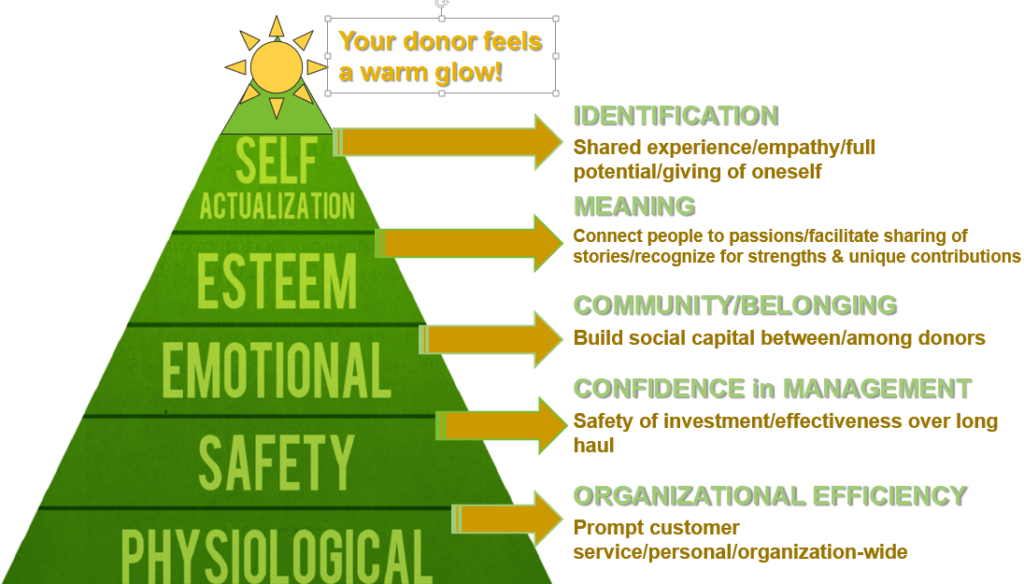 Assuming people don’t want to be asked to make a philanthropic gift is one of the biggest misconceptions of what constitutes being donor-centered.
Assuming people don’t want to be asked to make a philanthropic gift is one of the biggest misconceptions of what constitutes being donor-centered.
Or even kind, thoughtful and respectful.
Alas, when you spend all your time on cultivation, assuming folks don’t need a direct ask and will simply give spontaneously as a result of being passively asked, or even outright wooed, everyone loses.
- You short-change your organization.
- You short-change your beneficiaries.
- You, especially, short-change your would-be donors.
Why?
FIRST: Donors want to be asked because they’re starved for the love that comes from voluntary giving and receiving.
Donors have love to give, but don’t always have an object towards which to direct their affection.
SECOND: Donors need to be asked because when they’re not, they don’t know how much you need their help.
Consequently, giving feels a bit like a crap shoot. Empty, not meaningful. Donors want you to honestly tell them when and how and how much to give, so investing their money fills them with confidence it will be appreciated and do the most good.
Don’t make donors guess whether you truly find them worthy of loving you.
Donors are Love-Starved
One of my favorite songs is from the Jefferson Airplane:
When the truth is found to be lies
And all the joy within you dies
Don’t you want somebody to love
Don’t you need somebody to love
Wouldn’t you love somebody to love
You better find somebody to love
What are you, and all these people, doing with the gift of life?
Sure, everyone is busy, busy, busy.
But is all that busy-ness making folks happy?
Are people stopping to really think about what makes their lives meaningful?
Sometimes, yes.
Often, not so much.
You can help would-be donors stop and smell (and enjoy) the roses, so to speak.
Philanthropy is Love
Literally, the translation from the Greek is philos (love) + anthropy (humanity).
Your job – should you choose to accept it — is to be a facilitator of this love.
People, for the most part, truly want to be helpful.
So, think of your job, as a philanthropy facilitator thusly:
- To become an object of your would-be donor’s affection – their much-yearned-for love recipient.
- To offer a way for people to find somebody to love, and enact their values in a meaningful way.
- To facilitate ongoing feedback about how much their expression of love makes a positive impact.
Sure, donors may have other loves in their lives. Their families. Their jobs. Their friends. Their hobbies. Even other charities.
But it’s not for you to decide that’s all they want or need.
In fact, if you’re familiar with Maslow’s Hierarchy of Needs you know people have varied needs over different phases in their lives. Needs for community, belonging, self-actualization and other kinds of meaning and purpose that bring people joy.
The joy from philanthropic giving is special, and merits encouragement.
Philanthropy is Addictive
When you do a good job of philanthropy facilitation, people will want to do it again and again.
It makes people feel good!
In fact, giving brings a warm glow of satisfaction, akin to eating chocolate. MRI studies show when people merely contemplate giving it lights up the pleasure centers in their brains.
Think about this. You’d probably agree that bringing a donor a gift of chocolate (unless they’re allergic or diabetic) is a donor-centered gesture, right?
Then why isn’t asking also a donor-centric act?
- It’s not donor-centered to deprive would-be donors of their warm glow opportunity.
- It’s donor-centered’ to givethe opportunity to love and be loved.
As it is variously said: “Give and you shall receive.”
This should be the mantra of all fundraising. Especially major gift fundraising.
Philanthropy gives people purpose. And purpose gives people joy.
Donors are Meaning-Starved
Again, when you ask you’re not taking, you’re giving.
And what you’re giving is opportunity.
The value of that opportunity will vary from donor to donor. And it will mean different things at different points in each person’s life.
The point is you can give donors the meaning they seek.
That’s a powerful, and noble, role you play. And the more you listen to donors, and endeavor to learn what floats their particular boat, the better you can tailor your ask to elicit a response that will give your donor the biggest value payoff possible.
Truly donor-centered fundraising takes into account your donor’s needs.
In so doing, you’ll find your needs are met as well.
Consider Your Donor’s ‘Hierarchy of Needs’

In your donor’s journey towards feeling really joyful about their engagement and investment with you – be it awareness building, cultivation, solicitation or ongoing stewardship – consider your donor’s perspective at that point in time. What do they need/want to hear from you?
At some point, to get people to that ‘warm glow,’ you’re going to have to make a direct ask – the more targeted and personal, the better.
Don’t Say “No” on Others’ Behalf
Stop making excuses for not asking.
Fear of rejection will also bring your donor’s journey with you to a cold, hard stop. Not good!
I often hear staff or board say things like:
- “Now’s not a good time to ask, as she’s going through chemo.”
- “Now’s not a good time to ask, as he just became a widower.”
- “Now’s not a good time to ask, because she just lost her job.”
- “Now’s not a good time to ask, as they’ve got two kids in college.”
- “Now’s not a good time to ask, as he just got home from the hospital.”
Goodness, how presumptuous!
Do you treat donors like they can’t think for themselves?
People are perfectly capable of saying “no” on their own behalf.
And you can’t assume anything. You know what they say about the word “assume,” right?
Someone going through a tough time, for whatever reason, might welcome the opportunity to bring something good into their life! They might enjoy the personal interaction that comes from being asked to give. In fact, this might be precisely the time they most need to become involved in something larger than themselves.
If not, they’ll tell you.
Giving brings meaning and fulfillment on a high level.
Don’t Deny Opportunity to Bring Love and Meaning into a Donor’s Life
People need to give.
It’s something for which our brains are hard-wired.
So stop considering your own needs and consider your donor’s.
I don’t care if you’re afraid to ask. Get. Over. It!
If you don’t, you’ll never succeed in this business. Not for your organization, not for yourself, and most certainly not for your donors.
It’s like buying up a bunch of merchandise people are clamoring to buy, stocking your store with the stuff, sending out flyers announcing you’ve got the goods, watching as people line up to see, touch, taste or otherwise sense your wares, and then… never opening the doors for your sale so folks can actually satisfy their cravings.
It’s simply not okay to wash your hands of the need to ask.
Philanthropic Giving Makes People Happy!
Daniel Pink, author of the wonderful book To Sell Is Human, argues we’re all in sales today.
And ‘selling’ is not a bad thing.
Not at all.
Especially not when you have something people want to buy!
Think of your nonprofit as a store where people shop for love and meaning.
Within your social benefit ‘store’ you’ve:
- Created programs that offer meaningful solutions to relevant problems.
- Populated your website with information describing value-laden, life-altering initiatives.
- Developed marketing messages driving people to your website, events, social media, and physical site.
- Managed to interest, excite and engage people with your cause.
But then…
If you never quite get around to making a direct, specific ask to invest in the change would-be donors want to see – and want to become an integral part of – what have you accomplished?
You may think you’re saving people money — by not asking to “take” something away from them. This is a subconscious bias we have when it comes to the topic of money — still one of the biggest taboos in our society.
But never, ever forget that philanthropy (i.e., “love of humanity”) is about love, not money. And philanthropy is a voluntary, value-for-value exchange.
If you don’t make it easy for people to exercise their choice to spend their money in ways that bring them joy and satisfaction, you’re not being caring.
You’re kind of being mean.
EXAMPLE: I’ll often ask board members if they love the charity on whose board they serve. Of course they say “yes!”
Then I’ll ask them why they’re being so stingy with that which they love. Why aren’t they sharing the love by asking others to join them?
This really flips the equation for most folks, helping them understand the values their nonprofit enacts and how these values may align significantly with those of their would-be donors.
That’s how you want to approach major gift fundraising.
Come from a place of love and values, not from a place of need and money.
When people join together to share love and enact shared values, it’s amazing what wonders may ensue.
Photo by RDNE Stock project on Pexels






Thanks for this post. I find this is one of the biggest challenges working with the EDs, boards and the clergy I work with. I wrote a similar post years ago and here’s one of the quotes (remember, I work with the faith community),
“And maybe, just maybe – knowing that you can help usher someone “into the heart of the God-love,” knowing that you can fill that person with happiness, and help him or her change the world – well maybe then you’ll be less afraid to give them the opportunity to give.”